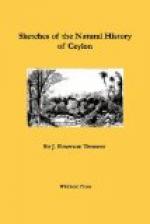Grandeur of the scene
Story of young pet elephant
CHAP. VII.
THE ELEPHANT.
* * * * *
Conduct in Captivity.
Alleged superiority of the Indian to the African elephant—not true
Ditto of Ceylon elephant to Indian
Process of training in Ceylon
Allowed to bathe
Difference of disposition
Sudden death of “broken heart”
First employment treading clay
Drawing a waggon
Dragging timber
Sagacity in labour
Mode of raising stones
Strength in throwing down trees exaggerated
Piling timber
Not uniform in habits of work
Lazy if not watched
Obedience to keeper from affection, not fear
Change of keeper—story of child
Ear for sounds and music
Hurra! (note)
Endurance of pain
Docility
Working elephants, delicate
Deaths in government stud
Diseases
Subject to tooth-ache
Question of the value of labour of an elephant
Food in captivity, and cost
Breed in captivity
Age
Theory of M. Fleurens
No dead elephants found
Sindbad’s story
Passage from AElian
CHAP. VIII.
BIRDS.
Their numbers
Songsters
Hornbills, the “bird with two heads”
Pea fowl
Sea birds, their number
I. Accipitres.—Eagles
Falcons and hawks
Owls—the devil bird
II. Passeres.—Swallows
Kingfishers—sunbirds
The cotton-thief
Bul-bul—tailor bird—and
weaver
The mountain jay
Crows, anecdotes of
III. Scansores.—Parroquets
IV. Columbidae.—Pigeons
V. Gallinae.—Jungle-fowl
VI. Grallae.—Ibis, stork, &c.
VII. Anseres.—Flamingoes
Pelicans
Strange scene
Game—Partridges, &c.
List of Ceylon birds
List of birds peculiar to Ceylon
CHAP. IX.
REPTILES.
Lizards.—Iguana
Kabara-goya, barbarous custom in preparing
the kabara-tel poison
Blood-suckers
The green calotes
The lyre-headed lizard
Chameleon
Ceratophora
Geckoes,—their power of reproducing
limbs
Crocodiles
Their sensitiveness to tickling
Anecdotes of crocodiles
Their power of burying themselves in the
mud
Tortoises.—Curious parasite
Terrapins
Edible turtle
Cruel mode of cutting it up alive
Huge Indian tortoises (note)
Hawk’s-bill turtle, barbarous mode
of stripping it of the tortoise-shell




